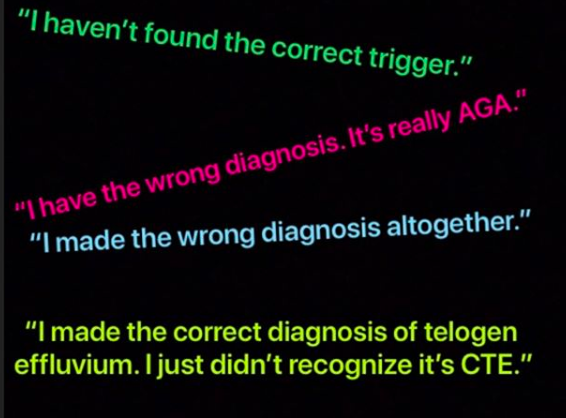Shedding, Shedding, Shedding: Why Won't it Stop?
Why Won't it Stop?
Being a hair specialist is as much about trying to get hair back on the scalp as it is trying to figure out why it’s leaving the scalp in the first place. There are dozens and dozens of reasons to lose hair. Some diagnoses are easy. Some are challenging. Some look easy but can fool you as they are a close mimicker of another condition.
Telogen effluvium (TE) refers to hair shedding in excess of what is normally experienced by the patient. A variety of triggers commonly cause TE including low iron, thyroid problems, crash diets and medications. Once the trigger is properly identified and “fixed” the hair grows back. (for example once the dieting stops the hair shedding stops in 6-9 months). TE is among the most frustrating of conditions because many conditions can mimic TE. Far too many patients are told to just be patient as the shedding will stop only to find 6-9 months later that the shedding has not in fact stopped.
Why would shedding not stop?
Well, there are a number of reasons for this. First, we need to consider that we may not have found the right “trigger.” We might not realize that the patient’s supplement they started last year is actually the trigger. We not have realized that the patient’s fatigue and headaches and sore joints are actually a sign of underlying disease.
Second, we need to be humble to the fact that we may have the wrong diagnosis and were fooled into thinking this is a TE. Androgenetic alopecia (female thinning and male balding) often starts with shedding that perfectly mimics a TE. Some early scarring alopecias like lichen planopilaris can mimic TE.
Finally, we may have got the general diagnosis of telogen effluvium correct but failed to recognize that the patient’s hair shedding really fits best with chronic telogen effluvium or “CTE.” In true cases of CTE a trigger can often not be found.
Conclusion
Excessive hair shedding is frequently seen with TE. However, physicians need to keep a broad and open mind to other possible diagnoses if the shedding does not stop.
This article was written by Dr. Jeff Donovan, a Canadian and US board certified dermatologist specializing exclusively in hair loss.

